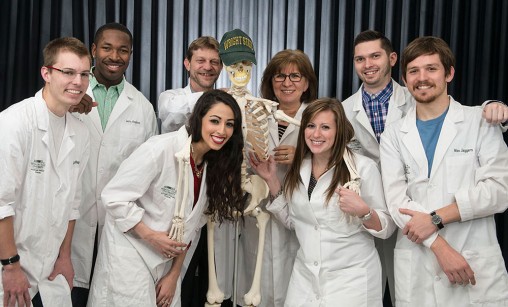
Wright State’s Department of Neuroscience, Cell Biology and Physiology will offer an anatomy and physiology lab for high school students starting in January.
A unique anatomy and physiology lab at Wright State University will soon be offered to high school students to enrich their understanding of the human body, help them make career choices and expose them to opportunities at the university.
The two-hour, single-session Human Anatomy and Physiology Interactive (HAPI) lab, held at the Boonshoft School of Medicine, will be available to between 15 and 30 high school juniors and seniors from interested schools beginning on Friday, Jan. 23, 2015. The labs will continue to be offered to schools on each subsequent Friday.
“We are looking for serious students who are looking at colleges and likely have an interest in science and medicine,” said Thomas L. Brown, vice chair for research in the Department of Neuroscience, Cell Biology and Physiology. “This lab will give them something that will expand their minds, but also help them make career decisions. It is going to be something they truly remember.”
The Department of Neuroscience, Cell Biology and Physiology, chaired by professor Timothy Cope, is part of both the School of Medicine and the College of Science and Mathematics.
Cope said the interactive experience will enable Wright State to share the excitement of learning and discovery about the human body and its structure.
“Society is increasingly better informed about human disease and injury and its medical and biological effects,” he said. “Through this program we hope to extend knowledge and curiosity and to provide even better understanding of topics commonly covered in the media such as traumatic brain injury, Parkinson’s disease, smoker’s lung and cirrhosis of the liver, just to name a few.”
The labs will be taught by anatomy instructor Bridget Severt, associate professor Barbara Kraszpulska and seven graduate teaching assistants who are part of Master of Science Anatomy program.
Most of the high school students are expected to be from the local area, but HAPI lab will be available to students from high schools statewide as well as those at community colleges and technical schools.
The labs will be offered throughout the spring semester and then expand during the next academic school year. The popularity of this program is already evident as many of the labs for the 2015 spring semester are already beginning to fill up.
“This will be a real hands-on experience that will not only enrich students’ understanding of human anatomy and physiology, but also the broader experience of what Wright State University is all about and what it can do for them,” Brown said.
For more information about the program, contact Bridgett Severt at bridgett.severt@wright.edu or Barbara Kraszpulska at barbara.kraszpulska@wright.edu.

 Wright State names Rajneesh Suri dean of Raj Soin College of Business
Wright State names Rajneesh Suri dean of Raj Soin College of Business  ‘Only in New York,’ born at Wright State
‘Only in New York,’ born at Wright State  Wright State president, Horizon League leaders welcome new commissioner
Wright State president, Horizon League leaders welcome new commissioner  Wright State celebrates homecoming with week-long block party
Wright State celebrates homecoming with week-long block party  Wright State baseball to take on Dayton Flyers at Day Air Ballpark April 15
Wright State baseball to take on Dayton Flyers at Day Air Ballpark April 15 